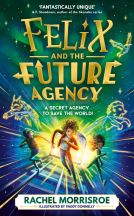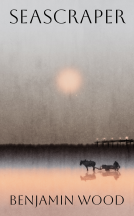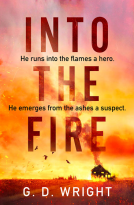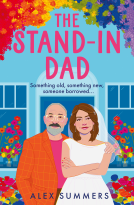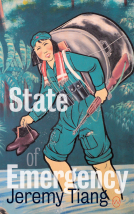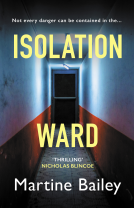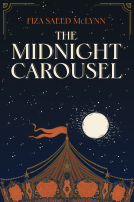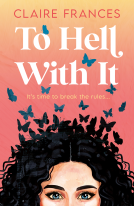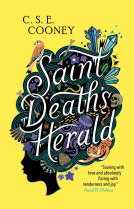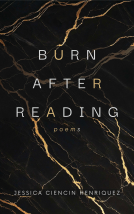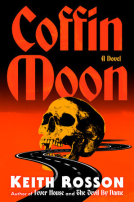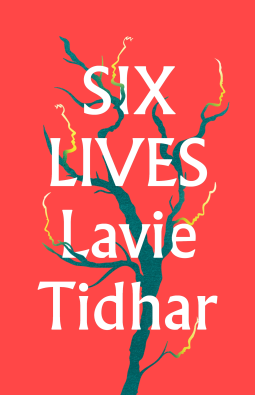
Six Lives
by Lavie Tidhar
This title was previously available on NetGalley and is now archived.
Send NetGalley books directly to your Kindle or Kindle app
1
To read on a Kindle or Kindle app, please add kindle@netgalley.com as an approved email address to receive files in your Amazon account. Click here for step-by-step instructions.
2
Also find your Kindle email address within your Amazon account, and enter it here.
Pub Date Aug 29 2024 | Archive Date Aug 29 2024
Head of Zeus | Apollo
Talking about this book? Use #SixLives #NetGalley. More hashtag tips!
Description
SIX LIVES
Six lives, connected through blood and history, each rooted in the dirt of their inheritance, look to the future, and what it might hold.
THE GUANO MERCHANT
In 1855, Edward Feebes travels to the guano islands of South America, to investigate an irregularity in the accounts of the House of Feebes & Co.
THE BLACKMAILER
In 1912, post-mortem photographer and reluctant blackmailer Annie Connolly plots her escape from Ireland to America on board the Titanic.
THE IDEALIST
In 1933, idealistic Edgar Waverley faces a choice of the heart when he becomes embroiled in a country house murder.
THE SPY
In 1964, hapless KGB agent Vasily Sokolov makes his career conjuring valuable information from worthless detritus.
THE MOVIE STAR
In 1987, actor Mariam Khouri looks back at 'Black Dirt’, the movie that lifted her from the streets of Cairo.
THE HEIRESS
In 2012, Isabelle Feebes attempts to break with her poisonous heritage once and for all. Can she forge a new life for herself in the New World? Can you ever truly escape your past?
Available Editions
| EDITION | Hardcover |
| ISBN | 9781804543511 |
| PRICE | £20.00 (GBP) |
| PAGES | 464 |
Available on NetGalley
Featured Reviews
 Alex S, Reviewer
Alex S, Reviewer
Another wonderful book from Lavie Tidhar, sweeping you along in a family epic spanning continents and centuries.
Lavie Tidhar's latest novel is a sweeping epic, which crosses centuries and continents. Each of its six sections details a different story, giving this the feel of six short stories, for although there is a family name which connects the stories, they can be read independently of each other.
If you are familiar with Tadhar's back catalogue, you will be aware he likes to switch genres, which is something he does with the stories here: there is historical drama, a 1930s murder mystery, a spy thriller and more. This gives this book a real sense of readability and unpredictability which I really liked - I was wondering where Tadhar would take his novel next. I ended up reading this in one sitting.
Thank you to Netgalley and the publishers for the ARC.
 Viv R, Reviewer
Viv R, Reviewer
Another excellent novel by Lavie Tidhar. I love the unexpectedness of Tidhar’s books and this one has the added bonus of six stories with six different genres, yet all of them linked.
Tracing the tributaries of family and kinship over centuries
Six Lives does exactly what it says on the tin, following six lives in one loose-knit family, by blood and as found family, moving from mid-Victorian colonial trade to twenty-first century nepo baby, with a familiar cast of characters cropping up in each of the six time periods, and recurring themes of grief and loss, parents and children. and the vagaries of time.
Each section is well-defined against the rest, with vibrant central characters that fair leap off the page and enough detail to fill a book of its own. There's also lots of story in the interstices within and between each strand, not quite a collection of short stories and more like a roman fleuve but without the length. The geography in each strand is brilliantly realised, the landscape as much a function of the narrative character as it is a backdrop; taking in colonial Peru. early twentieth century Cork, a Home Counties manor, mid-century Cairo, Eighties Rome, and twenty-first century NYLON.
I'm still not sure what to make of it. Well-crafted, the characters fascinating and grotesque in equal measure, but I'm still waiting for the shoe to drop.
Interesting: four stars.
 Reviewer 1394760
Reviewer 1394760
As the name implies, Six Lives contains 6 interconnected stories, featuring six main characters.
Pros: The variety of genres and themes (although, some themes overlap), the liberty of reading these stories independently, the time settings.
Mariam’s story was the one that I have enjoyed the most content wise, and I found the prose of The Heiress much more enchanting than some others’.
Excellent.
This book can be read on two levels: merely as a set of great interlinking stories, hugely entertaining, because the characters and their lives are so interesting; but also, in typical Tidhar fashion, as tongue-in-cheek homage to 6 different literary genres, with layer upon layer of meaning, and multitudes of appropriate references to each era and genre.
Tidhar is, amusingly, quite ruthless; the "historical saga" that the book opens with is a pointed dig at most other examples of this genre, which are usually replete with unending detail. In his signature bare prose (sometimes as abrupt as that of an 8-year-old), Tidhar dispenses with all dross, and yet manages to paint an evocative picture of the surroundings of 1855 Lima.
The country house mystery was far, far from cosy, indeed, quite stressful, and the outcome was, again, completely at odds with the works of any of the Golden Age authors.
The other stories and genres were just as cleverly transposed, but I did have a bit of an issue with Annie's story, which, while good in itself, lacked veracity (I know, they are all based on fictive approaches, but still!). Over 100 hundred years later, with abortion now legal in Ireland, it's still practically impossible to get this service in the country; the only people who might have had access to such things at that time would have been either Protestants or the absolute dregs of Dublin slums (as the only city worth the name at the time). The former situation would actually have provided a nice complication in the plot, and a deeper exploration of both Annie's character and the times.
I felt an undercurrent of tension throughout the book, an almost subconscious dread, which was weird, as most of the stories were fulfilling in themselves. I think this was intentional on the part of the author, underscoring the existential theme of the book, the exploration of whether we are bound by our ties to the past, through blood or other connections, or whether we can ever escape it - and, if we do, are we going to enmesh others in our own web of connections?
Finally, I think Tidhar is possibly a victim of his own brilliance - the research, literary allusions and intricate web of connections are all superb, but maybe the one thing, despite the heavy philosophical questions, and the good old narrative arcs that the characters enjoy, that this book lacks, is heart. But maybe you can't have it all. Certainly this is a great read, and one to which I will be returning.
 Dmitry P, Reviewer
Dmitry P, Reviewer
Six loosely connected stories about six loosely connected individuals spanning 200 years of human history. Each story is a great testament to the author's ability to capture the spirit of the era and convey the struggles of humans inhabiting it. We get to know a mid-level law clerk in a banking conglomerate in the 19th century, a poor young Irish woman trying to survive the hardships of her time, a young man who ends up embroiled in international spycraft, a Soviet spy trying to make the most of his posting in post-war and post-Stalin Cairo, a young Egyptian woman carving her own fate from the slums of Cairo to the silver screen, and, finally, a 20-year-old Gen-Z struggling to find purpose and meaning in life.
As with most of the author's work, I genuinely enjoyed the writing here. The research going into each "life" is exemplary, and shows the breadth and depth of the author's talent. The dialogues are witty and flow easily, and the characters are difficult to not sympathise with, because of, and not despite, their flaws. The monumental task of describing the history of the last 200 years is brought to life in these micro-moments of people's lives, and this is what indeed makes the novel unique and fascinating at the same time. There are echoes in this from both Adama and Maror - in style if not in substance. The author's belief that history comes to life via the simple people that it happens to is dominant here as well.
I liked the book a lot, and would recommend it wholeheartedly to both fans if historical fiction, and the author's non-speculative-fiction work. There is something in this book for nearly everyone. The only thing that makes this book, in my view, inferior to both Adama and Maror is the dryer delivery. It's almost as if the author's soul was not truly in it. It felt like an intellectual exercise, and less a soulful and emotional one. If I hadn't read the other two books I would have felt different, perhaps. However, knowing the depth of emotion that the author's writing can convey and elicit in a reader, this book came across as more sterile, in that sense.
My thanks to Netgalley and the publisher for providing me with an early copy of this book in return for an honest review.
 André N, Reviewer
André N, Reviewer
I'd only read short fiction by Lavie Tidhar when I got access to this ARC via NetGalley but I do have some of his books on my wishlist because he consistently seems to come up with interesting concepts.
Six Lives, as the name implies, consists on the exploration of the life and perspective of six people, living on subsequent times and impacted by what happened on the previous stories. The genre is fluid, from historical fiction elements to mystery and personal drama. There are three throughlines that are worth paying attention to in the book. The first is the most superficial and obvious, the influences of someone's choices not only in their own lives but on the lives of their descendants or close relations. The other is the exploration of what it is to live in the shadow of big money and the different relations that one can have with it and its people. The final and more interesting one is the idea of exploring and obtaining value from what others consider rubbish, despicable, forgettable. From guano exports to Cairo's trash, from irrelevant nephews to prostitutes and trash collectors, from disposable spies to directionless lives, how can we imagine, risk, try and achieve growth, worth, self-love? Through money, despite money or both? And by the end, even if you learn what you think is best, do you impose your view on others or is that in itself the privilege of money and power manifesting?
Tidhar's prose is simple and effective, the narrative is easy to follow, with a few moments where the words shine through and become quite quotable, though never pedantic. Six Lives is good book that can be really good if you allow yourself to read more than the page and digest the thoughts.
 Eleanor F, Reviewer
Eleanor F, Reviewer
I was better aware of Tidhar as an author of science fiction (although I had never read any of his books up until now), but this is a straight realist-historical novel. Following, sometimes up close and sometimes from a distance, the fortunes of the Feebes banking family, it spans from 1855 to 2012, jumping decades between each section and focusing on a new protagonist each time, who, we come to realise, is connected to the Feebeses in some way. As far as technical accomplishment and reading enjoyment goes, I can't complain about Six Lives at all: it's unbelievably readable, each section engrossing. The sections break down into different genres—historical saga, spy thriller, Golden Age murder mystery—but I think this has perhaps been overstated by reviewers; the tonal and genre distinctions between sections are nowhere near as clear-cut as in, e.g., Calvino's If on a winter's night or Mitchell's Cloud Atlas. All the characters are worth spending time with, even those we discover are surprisingly unpleasant (Edward Feebes, a banking clerk in 1855 sent to Peru to protect Feebes interests there, for example) or lack much agency (Edgar Waverley, socially ambitious but without a title, whose experiences form the core of the country house mystery in 1933, and who is railroaded into recruitment for both the British Secret Service and the socialist cause because of what happens there. Edgar is a fascinating character, actually; you see, in the next section, what has become of him, and though part of the power comes from the sideways approach, I would happily take a whole novel about Edgar).
My main issue with Six Lives is its mode: in short, I don't understand what this book is striving to be, as a piece of "realist" litfic, other than the sum of its parts. Books don't have to be more than the sum of their parts, but ambitious and creative ones usually want to be. I think Tidhar wants Six Lives to be, but it's not at all clear in what direction. There is plenty in it about the corrupting power of money, about how real power is to be found in the subtle ways that money permits some people to change the course of other people's lives, and if Six Lives has a point, that's probably it. But it says nothing about our options: if money and power corrupt, what is there to be done about it? Can you ever work against that system, in or outside of it? Can you ever use it to your own advantage, and if so, for how long? Those are questions that Neal Stephenson's Baroque Cycle, for example—for all its deep flaws—willingly engages with: characters who find themselves at the dawn of the invention of international finance try to fight it, try to use it, try to ride it up the ladder, try to ignore it, try to do all sorts of things with it. Tidhar's characters, in comparison, all seem peculiarly passive in the face of money. His skill is such that it hardly matters while you're reading the book, which takes you on a highly enjoyable tour of times and places, but it ultimately lessens Six Lives's memorability and power.
This book tells the story of six generations of people, connected by the threads of history. Or I could say it tells 6 stories. And that's where I found some frustration. It's a clever concept, cleverly done with the links between the time periods both obvious and subtle. But it's trying a little too hard to be conceptual, rather than just a novel. I found that, almost as soon as I found myself sinking into the plot of one of the stories it was over and I had to work out the next story. I was pulled out of the reading experience looking for the clever links between stories. All that said, this book is cleaver and interesting and the (final) ending tied it all up satisfactory. That said, I wanted something more - but I think that longing says more about me as a reader than Lavie Tidhar as a writer.
Thanks to NetGalley and Head of Zeus publishers for providing me with a DRC in exchange for an honest review.
In Six Lives, Lavie Tidhar has produced a literary version of six degrees of separation: the people in the stories are connected but separated enough by time and sometimes distance that each stands alone. First we meet stuffy, of-his-time Edward Feebes, a Victorian accounts clerk working in the family business – Peruvian guano; this part reminded me of William Boyd’s The Romantic. Next is Annie Connolly, a determined woman who strains against expected norms without it feeling too anachronistic. ‘All I do is listen to men talking’, she thinks at one point. Oh I hear you, Annie.
I knew Lavie Tidhar wrote prodigiously, across genres, and in Six Lives he gives a virtuoso display of different styles and perspectives all in one place. He adjusts the narrator to each subject and is equally good at writing women as men; the same cannot be said for even the most lauded male writers. He’s even managed to concoct and dispatch a country house murder, in just a sixth of a book. I warmed to some characters more than others so when I encountered one I really liked, and wanted to follow them further, the format was disappointing. But as each was revealed, I could see how not only the principal characters are connected, but the secondary ones too. Clever stuff.
Readers who liked this book also liked:
Kelly and Kristina Mancaruso
General Fiction (Adult), Mystery & Thrillers, Nonfiction (Adult)
Jessica Ciencin Henriquez
Biographies & Memoirs, Poetry & Verse, Religion & Spirituality
